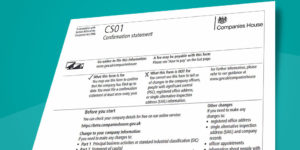Almost all registered companies in the UK are required to prepare annual accounts for Companies House and HMRC every year. The purpose of these accounts is to report the financial activity of the company and, subsequently, work out how much Corporation Tax it has to pay to HMRC.
- File your dormant company accounts here
- A professional company secretary to take care of your business
- Late filing penalties for limited companies
Directors are legally responsible for making sure annual accounts are completed accurately and submitted by the statutory filing deadline. Copies must also be given to the company’s shareholders or guarantors (members).
Different types of limited company accounts
All companies (with the exception of micro-entities, ‘small’ companies, and dormant companies) must deliver full annual accounts (‘statutory accounts’) to Companies House and HMRC. These accounts consist of:
- a profit and loss account
- a balance sheet
- notes about the accounts
- a directors’ report
- an auditors’ report (unless the company qualifies for exemption)
- name and signature of the company director
Small company accounts
Small companies can file abridged (simplified) annual accounts at Companies House, which consist of a balance sheet and notes about the accounts.
To qualify as small, your company must meet two of the following conditions:
For accounting periods beginning on or after 6 April 2025
- an annual turnover no more than £15 million
- a balance sheet total no more than £7.5 million
- no more than 50 employees on average
For accounting periods beginning on or before 5 April 2025
- an annual turnover no more than £10.2 million
- a balance sheet total no more than £5.1 million
- no more than 50 employees on average
Small company accounts are exempt from audit, so there is no requirement to include an auditors’ report. However, statutory accounts must still be provided to members and prepared for HMRC as part of the Company Tax Return.
Micro-entity accounts
Very small companies can prepare micro-entity accounts, which have even fewer requirements than small company accounts. To qualify as a micro-entity, your company must meet two of the following conditions:
For accounting periods beginning on or after 6 April 2025
- an annual turnover no more than £1 million
- a balance sheet total no more than £500,000
- no more than 10 employees on average
For accounting periods beginning on or before 5 April 2025
- an annual turnover no more than £632,000
- a balance sheet total no more than £316,000
- no more than 10 employees on average
Micro entities must still send statutory accounts to company members and to HMRC as part of their Company Tax Return.
Dormant company accounts
Dormant companies only need to prepare dormant accounts. These are made up of a balance sheet and notes about the accounts. They don’t have to send anything to HMRC, but they must tell HMRC that the company is dormant for Corporation Tax purposes.
How and when to deliver annual accounts to Companies House and HMRC
Your first annual accounts must be delivered to Companies House within 21 months of incorporation. These will usually cover a period of just over 12 months, starting on the date of incorporation and ending on the accounting reference date (ARD). The ARD is normally the anniversary of the last day of the month of company formation.
After the first year, accounts for Companies House will normally cover a 12-month period and should be delivered no later than 9 months after the ARD.
You can send annual accounts to Companies House using accounting software, online via the Companies House service, or by post.
Full annual accounts for HMRC must be included with each Company Tax Return and filed online no later than 12 months after the end of each Corporation Tax accounting period.
What is my company’s accounting reference date (ARD)
All companies are given an accounting reference date (ARD) when they register at Companies House. This date represents the end of the company’s financial year.
The first ARD for a company will be the anniversary of the last day of the month in which it was incorporated, for example:
- You register a company on 1 July 2025
- Your first ARD will be 31 July 2026
- Annual accounts must be ‘made up’ to this accounting reference date and filed at Companies House no later than 9 months after the ARD
- The ARD will remain the same every year unless you shorten or extend your financial year
Can I change my accounting reference date?
Yes, you can change your accounting reference date at any time, as long as it’s before the filing deadline. You cannot change it if your accounts are overdue unless the company is in administration.
You can shorten your 12-month financial year by as many months as you wish, as often as required. However, you can only lengthen your financial year once every 5 years, up to 18 months from the date of incorporation or the date of the previous year’s ARD.
If you wish to change your company’s ARD, the director must complete and file Companies House Form AA01 (previously Form 225). This is a very simple procedure that should only take a matter of minutes. Once completed, this form can be delivered via Companies House service or 1st Formations’ Online Company Manager.
The new ARD will be the date that all subsequent annual accounts must be made up to unless you make any other changes to the financial year.
Notifying HMRC of a change of ARD
Any changes made to the ARD will affect your Corporation Tax accounting period, so you must notify HMRC of any such changes as soon as possible.
Accounting periods may be shorter than 12 months. However, unlike your company’s financial year, the accounting period cannot be longer than 12 months.
If you lengthen your financial year to a period longer than 12 months, you will have to file two Company Tax Returns (one return for the first 12 months and another for the extra weeks/months).
Can I prepare my own company accounts?
Limited company accounting and taxation requirements are far more complex than those required by sole traders. Their accounts are on a much larger scale and they must adhere to strict accounting standards and practices set by the Financial Reporting Council (FRC).
As a director, you are legally responsible for keeping accurate accounting records, filing true and fair annual accounts at Companies House and HMRC, working out the tax liabilities of your business, filing Company Tax Returns, and preparing your own Self Assessment tax returns.
Your ability to fulfil these obligations will depend on your bookkeeping and accounting knowledge, as well as the complexity of your accounts. You should hire an accountant if you feel unable to carry out these tasks yourself.
There will be costs involved, of course, but the fees you pay to an accountant can be offset against the cost of your own time. An accountant can also suggest ways to minimise your tax bills and grow your business.
Should I use an accountant to prepare my annual accounts?
An accountant can be used by all types of businesses, from sole traders to multinational corporations. There are many benefits to be gained from doing so, not least the time and money you could save and the reassurance that everything has been done properly.
You should weigh up the amount of time you will have to commit if you do the accounting yourself, and whether paying fees to an accountant will be more cost-efficient than dedicating many hours of your own valuable time.
- Never miss another confirmation statement deadline
- Deadline for filing company accounts – 30 September
- An introduction to Capital Gains Tax for small businesses
- What are the filing requirements of a limited company?
An accountant can help you with many other financial matters beyond accounts and tax returns. They can prepare financial projections during the planning stage, help you to grow your business once it’s up and running, identify appropriate tax saving opportunities, assist with audits, and offer advice on ways to raise additional capital.
Depending on the size of your business, you may require a full-time accountant. Most small businesses, however, only need to use an accountant periodically when accounts and tax returns have to be filed.
The main functions and benefits of an accountant
- Structuring a company in the most tax-efficient way
- Working out the most effective way to remove money from a company
- Identifying tax-planning opportunities
- Claiming expenses
- Completing and filing statutory compliance documents
- Maintaining accurate accounting records
- Preparing and filing annual accounts
- Preparing Company Tax Returns and calculating Corporation Tax liabilities
- Advising about VAT and dealing with VAT calculations
- Handling Self Assessment requirements of company directors
- Keeping the company up-to-date with changes in taxation laws and legislation
- Maintaining all statutory company records and registers
- Advising on and recording share allotments and transfers
- Issuing and recording dividend payments to shareholders
- Managing payroll by ensuring all employees are given the correct tax code, and all payments are accurate and recorded
- Preparation of P46 and P60 paperwork
- Managing HMRC payslip booklets
- Suggesting areas where you can reduce costs and expenditure
- Utilising sophisticated accounting software that incorporates an audit trail. This is hugely beneficial in the unlikely event that a business is audited
- Assisting with loan or overdraft selection and applications. An accountant can provide valuable information to support applications, such as facts and figures relating to revenue projections and expenses. They are also better qualified to spot any unfavourable terms or conditions attached to banking services and agreements
- Handling growth transitions
- Managing inventory and pricing strategies
- Negotiating and structuring payment plans with suppliers and service providers
What information do I have to give an accountant?
If you appoint an accountant or tax advisor, you will need to provide them with a number of business and accounting records, including:
- Receipts and invoices for all goods and services bought and sold
- Utility bills
- Bank account statements
- Credit card statements
- Loan agreements
- Cheque book stubs
- Cash books and petty cash books
- Payroll records
- Dividend vouchers
- Details of any money owed by or to the business
- Expenses
- Details of any investments
- VAT records
- Details of any private money invested in the company
- Record of stock held by the company at the end of the financial year
You can keep a record of income, expenditure, assets, and liabilities in paper form in an account book, or you can use spreadsheets or a bookkeeping software package. However, copies of all accounting records and documents should be kept in their original forms, unless you can microfilm them or use an optical imaging system.
Choosing an accountant
It is important to choose an accountant who is appropriate for the type of work you do, particularly if you trade in an area that has specific tax rules or your company is a high-growth venture.
The majority of small businesses will simply require straightforward services from an accountant. In this case, you just need to find a reputable individual or local firm with a good track record of dealing with small businesses and start-ups. You may find it useful to ask friends or professional contacts for recommendations.
Arrange a no-obligation introductory meeting with a few accountants to compare their services and fees. Many of them offer the choice of monthly and annual fixed-fee services. This is a good way to plan ahead, and it can provide peace of mind knowing that all of your accountancy needs are taken care of.
On the other hand, you may prefer to use an accountant that can provide a pay-as-you-go service. This will allow you to pay only for the services you need, as and when required. However, these fees can mount up quickly so you must ensure all requirements and fees are discussed in advance.
Notifying HMRC
If you do appoint a tax advisor or an accountant to complete annual accounts and tax returns on your behalf, you must tell HMRC as soon as possible. However, as the director of the company, you still ultimately responsible. Therefore, you must ensure that your accountant is given accurate records and that they file accounts and tax returns by the statutory deadlines.
Corporation Tax Calculator
When are limited company accounts audited?
Audits can be time-consuming and costly because they involve a full stocktake and thorough analysis and review of all accounting records, including bank accounts.
Most micro-entities and small companies will not require an audit, unless:
- their articles of association explicitly state that an audit should be carried out
- an audit request is made by shareholders who own at least 10% of the company’s issued shares
An audit must be carried out by an independent accountant who is authorised to act as an auditor. Even if your company is exempt, an audit can be extremely beneficial because it will enable you to review the financial position of your company and reassure lenders and investors that your business is viable and profitable.
What is a profit and loss account?
A profit and loss account, which may also be referred to as a profit and loss statement, is one section of full financial accounts.
This statement shows the financial performance of the business over the course of a financial year, including the revenues generated from sales, the running costs incurred in generating these revenues, and the resulting profit or loss on operations during that period.
This information enables shareholders and directors to see how the business is performing. It is used by HMRC to calculate the tax liability of the company.
What is a balance sheet?
A balance sheet is another section of full financial accounts. It shows the assets and liabilities of a company (what it owns and owes) and the overall value of the business on the particular date that the balance sheet was completed.
Difference between annual accounts and annual confirmation statements
Annual accounts report the financial activity of a company during each financial year. Accounts must be prepared every year for Companies House and HMRC.
Annual confirmation statements should be filed at Companies House at least once every 12 months. The purpose of the statement is to confirm (and update where necessary) key company details on a certain date, including:
- registered office address
- SAIL address
- directors’ details
- secretary details
- shareholders’ or guarantors’ details
- share capital
- nature of business activities
- people with significant control (PSCs) of the company
- the company’s registered email address
The company information that can be updated on the confirmation statement are details of shares and shareholders, Standard Industrial Classification (SIC) codes, and exemption from keeping a PSC register. All other changes must be reported to Companies House separately, either before or at the same time as filing the confirmation statement.
Please note that the information provided in this article is for general informational purposes only and does not constitute legal, tax, or professional advice. While our aim is that the content is accurate and up to date, it should not be relied upon as a substitute for tailored advice from qualified professionals. We strongly recommend that you seek independent legal and tax advice specific to your circumstances before acting on any information contained in this article. We accept no responsibility or liability for any loss or damage that may result from your reliance on the information provided in this article. Use of the information contained in this article is entirely at your own risk.












Join The Discussion
Comments (8)
Please could you tell me the difference between “cash at bank” and “cash at bank and in hand” in the section Current Assets in the Balance Sheet.
Thank you.
Hi Javaid,
Cash at bank refers to the cash held in your bank account balance only.
Cash at bank and in hand refers to your bank account balance and any cash held in the business. This usually takes the form of ‘petty cash’, i.e. small amounts of change/money you have to buy everyday cheap items for office needs.
I hope the above clarifies the difference between the two terms.
Kind regards,
John Carpenter
Dear All.
I strted my Limited company on 17-Jun-2015 and Accounting period end is 31-jun-2016.
Can i shorten my accounting period to 31-Feb-2015 and submit account to Comanies house and file tax return to HMRC?
Dear Chandra
Thank you for your message.
You can shorten your accounting period to February if you want (you can lengthen or shorten the period by up to 180 days). You would then inform HMRC that the period was shortened and you would submit accounts and a CT600 for the shortened period.
Kind Regards
Hi. Is there a minimum amount of time the shareholders need to view and approve annual accounts? I am a shareholder in a small management company. The director has given us 7 days to reply. Thanks
Dear Vaibhav
Thank you for your message.
Unless there are details in the company’s articles of association then there is nothing within the Companies Act which is prescriptive regarding the approval of company accounts.
Kind Regards
Thanks a lot for the info.
I would like to know how to prepare those accounts in a company.
Dear Mallika
Thank you for your message.
We are not accountancy advisors so would not be able to advise you how to prepare your company accounts. It may best if you contact an accountant to give you advise on how to keep your company accounting records.
Kind Regards